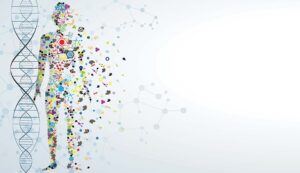
Through public engagement and education initiatives, ASHG strives to be a reliable and sought-after source for public information on the benefits of human genetics and genomics research. This information should be accessible to anyone with an interest in the field. While many people enrich their knowledge of this field through ASHG’s Discover Genetics resources, classrooms are often the first place that introduces someone to the world of human genetics. Many ASHG members can remember the first time they encountered a Punnett square or learned about Gregor Mendel’s discoveries. As many educators know, introducing a topic leads to questions and clarifications. Teachers are often asked to navigate conversations and questions about genetics intersecting with the social environment and culture. In recognition of this, the ASHG Public Education & Awareness Committee (PEAC) and its Diversity, Equity, and Inclusion (DEI) Task Force collaborated to create a webinar to aid this dialogue titled, “An Educator’s Resource on Discussing Cultural Awareness and Competency around Human Genetics”.
The webinar was determined to be held at the beginning of the 2021 school year with learning objectives aimed at creating a resource for educators and beginning a dialogue that could be used in future years. “Science classrooms are often the catalyst for important discussions about human genetics and its role in society, health, and research, among other areas. Important conversations and perspectives about these topics are coming to the forefront of the general population’s awareness more often. It is essential that teachers have support as they enable and engage in these conversations with students. The intention of this webinar was to provide content that supplements these discussions, from research findings to background about how cultural awareness and competency has been handled in the human genetics community,” said Maurice Godfrey, PhD, PEAC chair.
Neil Risch, PhD, and Digna R. Velez Edwards, MS, PhD, were selected as speakers to share their experiences and findings related to cultural awareness and competency in relation to human genetics and genomics. Dr. Risch discussed how genetic variation is structured in the human population, including consequences of human evolution; categories of race and ethnicity; how genetic ancestry is defined and estimated; and the relationship between race, ethnicity, and genetic ancestry. Meanwhile, Dr. Velez Edwards, addressed the importance of diversity, equity, and inclusion considerations in genetics research in the context of the shifting trends in the U.S. census, disease risk, the many groups which fall under the term “underrepresented”, the importance of intersectionality, and how to increase diversity in genetics and genomics research. Moderator Dr. Godfrey brought his experience as a dedicated PEAC member who has extensive expertise in public engagement and education, including work with Native American communities. “It was important to have presenters who could speak to technical research as well as the societal impacts of this topic. Dr. Risch brings vast technical knowledge from his research of population genetics. Dr. Velez Edwards brings her expertise as a genetic epidemiologist whose focus is on identifying genetic and environmental factors for outcomes related to women’s health and complex diseases with noted racial and ethnic health disparities. Their perspectives provide educators with a well-rounded view of this topic from many levels,” said Dana Crawford, PhD, chair of the DEI Task Force.
Questions are an essential part of learning and will continue to arise both in the classroom and beyond. The webinar was created to be a valuable resource with a long shelf life. It is currently available on-demand on the new ASHG Learning Center. Educators present and future can access this resource whenever they need additional support navigating these important conversations. For additional support, ASHG members can sign up to be part of the GENE Network to connect with local educators.
